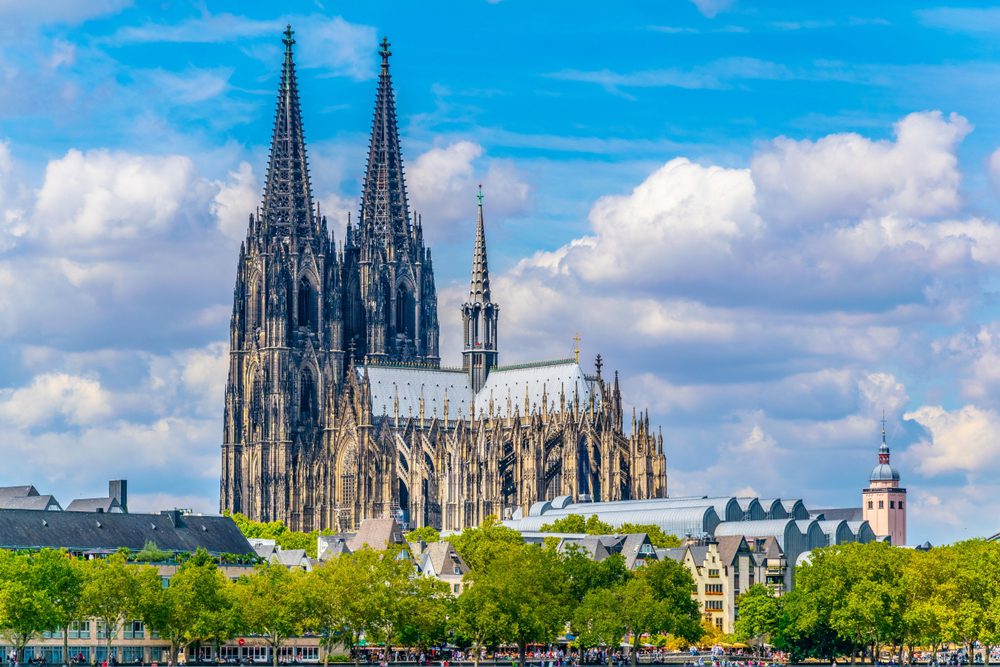
In a bid to be more ‘diverse,’ the Roman Catholic Archdiocese of Cologne has rebranded its logo: compared to the old design, the new one does not feature the famous spires of the Cologne Cathedral. In other words—as the German publication, Junge Freiheit put it—the archdiocese has cancelled its own cathedral.
Die #Köln|er #Erzdiözese hat ein neues Corporate-Design. "Erzbistum streicht #Dom aus Logo", stand daraufhin in den Schlagzeilen. Diese Kritik kann @aschaffrinna nicht nachvollziehen. https://t.co/d158h6kxQl
— katholisch.de (@katholisch_de) September 5, 2023
Church official Frank Hüppelshäuser explained the decision to rebrand the logo with a very vaguely worded statement:
It is crucial, especially in these challenging times, to make the many good sides of the Church more visible to the outside world.
He added that the new design aims to “promote awareness of the diverse commitment of the people,” and that it is important “to both preserve what is good and courageously create space for something new.”
Aside from Junge Freiheit, the daily newspaper Frankfurter Allgemeine Zeitung was also baffled by the statement, failing to understand the reasons behind the modification and why the archdiocese decided against retaining the image of the cathedral’s spires in its new logo. Frank Hüppelshäuser argued that the new logo represents the whole archdiocese, not just the Cologne Cathedral. “Every beer brand has the landmark in its logo, but the archdiocese is much more than just the cathedral,” he told public broadcaster, WDR.
Das @Erzbistum_Koeln hat den Dom aus seinem Logo gestrichen. Das Bistum sei mehr als der Dom und der sei zudem als Symbol beliebig geworden, erklärt der Amtsleiter. https://t.co/WoE8rSXrgb pic.twitter.com/hfEoSRJ44x
— WDR Aktuelle Stunde (@aktuelle_stunde) September 3, 2023
The rebranding comes a year after the city of Cologne also dumped its logo, and created a new one almost identical to the old one, but without the cathedral’s spires. City administrators rejected criticism that the alteration was part of a larger pattern of neglecting or erasing evidence of Christian roots in Western Europe. “Cologne’s Christian history is still in the logo—in the form of our city emblem,” the city spokesperson told the German news agency DPA.
Die Stadt Köln nimmt den Dom aus dem Logo der Stadt, weil es "altbacken" wäre.
— Ali Utlu (@AliCologne) March 28, 2022
Wie kann eine Stadt das größte Wahrzeichen der Stadt streichen? Köln ist der Dom, der Dom ist Kölle.
In 10 Jahren dann die Kölner Moschee im Logo? Wer weiß.. pic.twitter.com/DGREDl0yhY
Funnily enough, the dean of the Cologne Cathedral, Robert Kleine, criticised the city’s decision in March of last year. “There are many churches and cathedrals with two towers, but the two spikes in the old logo were very subtle and yet everyone knew: ‘Ah, this is Cologne. That’s Cologne Cathedral,’” he said. “I think people want to follow a trend and move with the times. Everything is somehow being objectified, and the cathedral has been kicked out in the process. Other cities are already putting their landmarks back into their logos and are proud that they have something to advertise,” the clergyman explained, making the cathedral’s rebranding even more baffling.
The latest development hasn’t received too much attention in German media, but a few politicians vented their anger on social media.
Beatrix von Storch, a prominent member of the opposition right-wing party Alternative für Deutschland (AfD) tweeted “Heaven help us!”, with the accompanying hashtags ‘wokeism’, ‘Islamisation’ ‘cancel culture’. She had previously criticised the removal of the spires from the city’s logo as well, saying: “It is we ourselves who voluntarily erase our culture. We create a vacuum that others are happy to fill.”
„Erzbistum Köln verbannt Dom aus seinem Logo“. Wegen „Vielfalt“ und so. Himmel – hilf! So eine Kirche kann weg. #Wokismus #Islamisierung #CancelCulture
— Beatrix von Storch (@Beatrix_vStorch) September 5, 2023
Gerhard Papke of the governing liberal party Freie Demokratische Partei (FDP) wrote that while the Archdiocese of Cologne removes the silhouette of the Cologne Cathedral from its logo, “the muezzin in the city calls the faithful to prayer. Stages of cultural self-abandonment!”
Justice Minister Marco Buschmann, also of the FDP, was less anxious, calling the rebrand “finally something with transparency and healthy self-awareness.”
Glückwunsch zum neuen Logo und Corporate Design, liebes @Erzbistum_Koeln Endlich was mit Transparenz und gesunder Selbstwahrnehmung. Auf das nun ehrliche Zeiten angebrochen sein mögen. Grüße von unterwegs, Ihr Marco Buschmannhttps://t.co/rrER5EoU9a pic.twitter.com/ihB2IZHZ5n
— Justizminister Marco Buschmann (Ernst & Satire) (@BuschmannFDP) September 4, 2023
The archdiocese’s move comes at a time when progressive elements are gaining more and more influence within the Catholic Church in Germany. As we previously reported, members of the so-called ‘Synodal Path’ called on the Catholic Church to allow priests to marry, women to become deacons, and same-sex couples to receive the Church’s blessing. Priests are already putting the suggestions into practice, with a priest in the Archdiocese of Cologne conducting a “blessing service for all loving couples.”
Venturing further into the political domain, one of the leaders of the ‘Synodal Path’, Irme Stetter-Karp, called for banning members of the AfD from lay positions within the Roman Catholic Church, arguing their conservative values are in contradiction to the faith.
